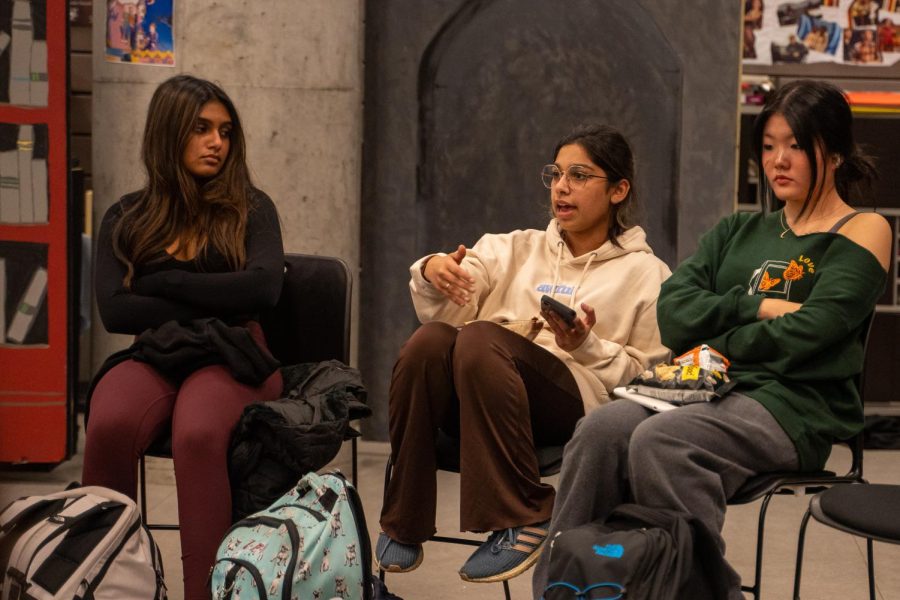In low-attended forum, students addressed hate expression
SPEAKING OUT. Sitting in a circle of chairs, senior Zara Baig discusses the role students can play in addressing hate at Lab during a Student Council-sponsored forum on Nov. 29.
December 1, 2022
Just four students joined a dozen Student Council members to recount personal experiences and propose solutions to hateful expression at the Laboratory Schools during a forum after school on Nov. 29. The Student Council-sponsored forum followed recent incidents of hateful expression.
The forum, held in the Markovitz Theater, focused specifically on the role students have in addressing instances of hate. The small attendance highlighted the lack of student participation in discussions regarding diversity, equity and inclusion.
Graham Robbins, all-school vice president, described an increase in students who are unwilling to take action against prejudice.
“You have a responsibility to hold both yourself and others accountable for whatever you consider to be your code or your standard of morals when it comes to these issues,” Graham said.
Sitting in a circle of chairs in the center of the room, students contributed ideas to effectively address hateful expression and articulated how this incident ties into a broader theme of prejudice rooted in U-High.
“Sometimes the only way, or the best way, to combat it is through uniform action through the community,” junior Max Mathias said. “I think that through talking about it, that absolutely aids in a joint process of fixing whatever the problem is.”
William Meyer, Cultural Union vice president, said that supporting affinity groups and having open forums is the best way to oppose incidents of hateful expression.
Five affinity groups had already addressed hateful expression occurring at school and on social media, as they issued a statement on Nov. 10 calling for administrative action.
Many at the forum voiced their frustration about the culture of purposeful instigation of hateful speech in the U-High community.
“One person might say something that is controversial, and it seems like a large group of people might start trying to provoke even worse responses out of this person, asking them questions, recording them,” said Adam Cheema, junior Cultural Union representative, “and often times it’s people who aren’t affected by these statements trying to provoke them and elicit those types of responses.”
Others said the public nature of assemblies about DEI leads to a lack of student participation.
“I really think that in large assemblies and large gatherings, intimate is important because you don’t want your voice broadcasting to the entire grade,” Max said. “Sometimes you do want to have an interactive discussion, but you can’t do that.”
This forum left students and spectating faculty with ideas of how to move forward with addressing hate at the Laboratory Schools, such as setting guidelines to encourage respect during group discussions, holding those who provoke hateful comments accountable and recognizing each student’s responsibility to ensure U-High is a safe environment for marginalized communities.
“We’ve been having a lot of discussions about what are some ways or tangible applications of how we’re having these conversations — what can we actively do for the community?” said senior Zara Baig, Asian Students’ Association president. “So, I think this conversation gave me a lot of insight on what more specifics we want to be looking for. For me, as my role in the community, I came here to be more enlightened on that.”




























































